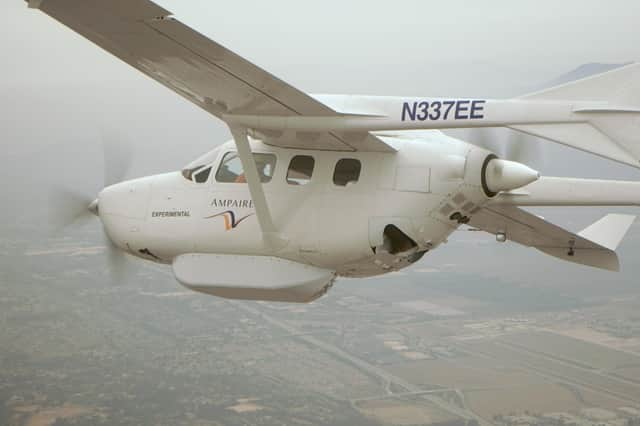Climate Change: Scotland's first electric-powered aircraft success after test flight in Orkney amid UN calls to decarbonise energy


The Ampaire test flight took off from Kirkwall Airport at the company’s £3.7m sustainable aviation facility and landed in John O’Groats Airport in Wick, in the north of mainland Scotland.
The company has said their six-seat Cessna Skymaster hopes to pave the way for retrofitting inter-island and short-haul flights with greener technologies.
Advertisement
Hide AdAdvertisement
Hide AdThe plane was built in 1974 but has been retrofitted with a battery pack at the company's headquarters in California.
The aircraft was shipped to Scotland for its first flight across open water between Orkney and Wick after initial test flights in Hawaii.
Test pilot Justin Gillen said: “The flight to Wick went without a hitch, flying at 3500 feet and 120 miles per hour. The Electric EEL is easy to fly and we’ve achieved a total five hours here so far.”
"It's the only hybrid-electric airplane that I know of flying today.”
Ampaire is developing a line of hybrid electric powertrain upgrades that it claims will reduce emissions and operating costs by as much as 25 per cent initially.
The electric engines on the aircraft are built at the front and back of the cockpit with the front engine being replaced with an electric motor that's a fraction of the size.
A large battery pack has been attached to the bottom of the plane which can keep the aircraft running for several hours in good conditions.
Ampaire says 90 minutes of battery charging would provide around an hour of flight.
Advertisement
Hide AdAdvertisement
Hide AdSusan Ying from Ampaire said: "It will fly cleaner, be more efficient and more economical.
"It will start as a short-haul but eventually, as the technology's improving, it could go into medium to long-haul."
Graeme Dey, Scottish Government Minister for Transport said: “The Kirkwall test center and companies such as Ampaire put Scotland at the forefront of the transition to low-carbon aviation.
"These demo flights are an important step towards delivering our commitment to decarbonize scheduled passenger flights within Scotland by 2040.”
In Orkney, island air links are considered vital for communities who live there and the greener battery-powered flights are under serious consideration for domestic planes.
Another option for powering flights is also the use of green hydrogen to de-carbonise aviation.
EMEC – the European Marine Energy Centre based in Orkney – is working with ZeroAvia on their HyFlyer project to use hydrogen for aviation in the Cotswolds.
Neil Kermode, managing director for EMEC said: "It’s fairly small scale at the moment – they’ve had a modified six-seater which only takes two people once modifications are finished and they are now working on the next project to get a 19 seater plane onto hydrogen.
Advertisement
Hide AdAdvertisement
Hide Ad"Hydrogen is coming into this space where in due course our 30-seaters that come down between here and Edinburgh and Glasgow and Aberdeen and Inverness – you could see that they could turn to hydrogen within a reasonable distance.”
A recent UN report showed there is a 'code red for humanity' as it set out the stark reality of the climate crisis and the impact fossil fuels have had on the planet.
A message from the Editor:
Thank you for reading this article. We're more reliant on your support than ever as the shift in consumer habits brought about by Coronavirus impacts our advertisers.
If you haven't already, please consider supporting our trusted, fact-checked journalism by taking out a digital subscription.
Comments
Want to join the conversation? Please or to comment on this article.
